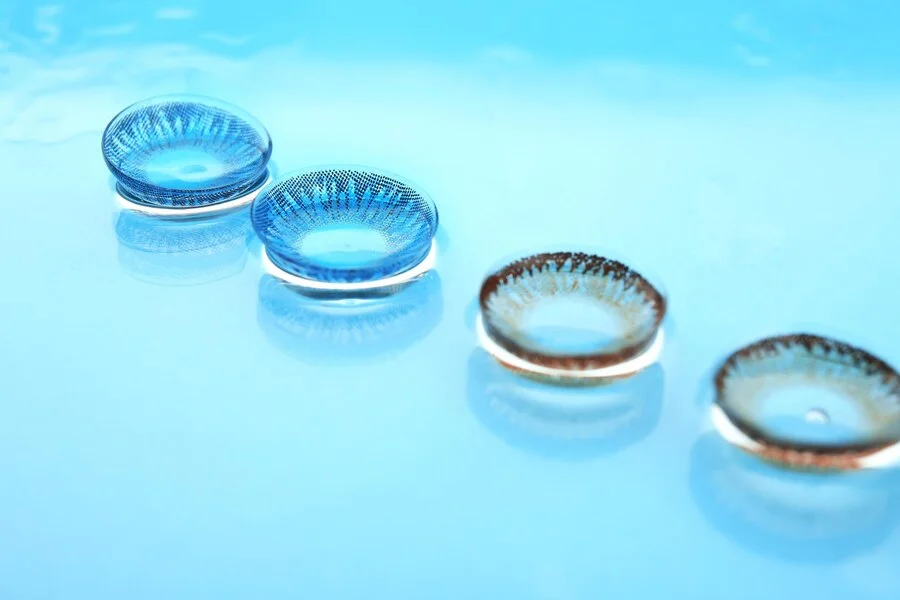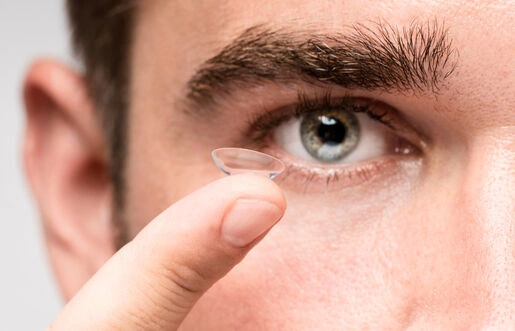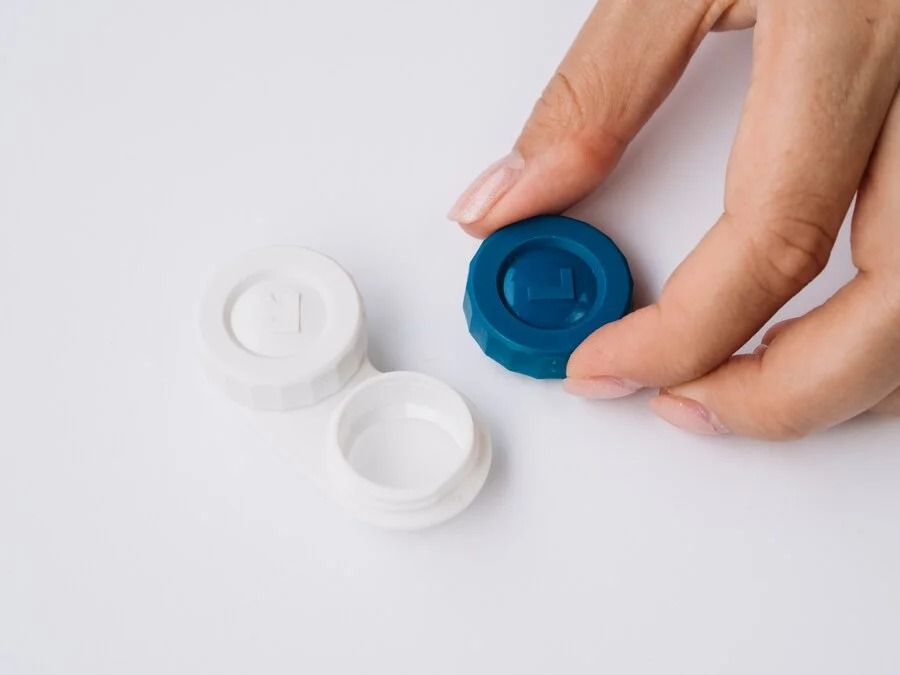If you wear contact lenses, they’re probably part of your daily routine. They provide clear vision without the hassle of glasses and are great for comfort and convenience. However, many wearers overlook one of the most important parts of contact lens care; knowing when to replace them.
Wearing lenses beyond their recommended period can seriously affect your eye health. Over time, protein buildup, bacteria, and dryness can cause irritation, blurry vision, and even infections. Regular replacement is key to maintaining contact lens safety and ensuring your eyes stay healthy and comfortable.

Importance of Changing Contact Lenses
Your eyes require oxygen in order to remain healthy. Although contact lenses may be designed to get oxygen to your eyes, keeping them on too long restricts airflow and traps of junk and bacteria on the lens materials.
Additionally, old lenses may also develop invisible tears that make them more susceptible to trapping germs. This scenario can lead to redness, discomfort, and increased chances of eye infection. Changing your lenses isn't just about ease of use; changing your lenses is an important component of vision health and protecting your eyes over the long term.
Regardless of whether your lenses are daily disposable, bi-weekly, or monthly, adhering to the manufacturer's replacement schedule and/or what you have been instructed to do by your optometrist will help reduce avoidable complications.
Common Signs It’s Time to Replace Contact Lenses
Many people continue using their lenses past the recommended period, thinking “one more day won’t hurt.” In reality, this can cause serious problems. Here are the most common signs that it’s time to replace contact lenses:
1. Blurry Vision
If your contact lenses no longer provide clear vision, it could mean they’re dirty, warped, or past their expiration period. Buildup on the lenses can interfere with clarity and comfort. Replacing them promptly helps restore sharp focus and protects your vision care routine.
2. Eye Irritation
Redness, itching, or a gritty feeling are clear signs of irritation. When old or damaged lenses rub against the cornea, they can cause micro-scratches that make your eyes more vulnerable to infection. If you notice persistent eye irritation, it’s time to switch to a fresh pair.

3. Dry Eyes
Many wearers experience dry eyes after prolonged lens use. Over time, worn lenses lose their moisture-retaining properties, leading to discomfort and sensitivity. Using rewetting drops can help temporarily, but replacing old lenses is the best way to restore comfort.
4. Lenses Feel Uncomfortable
Your contact lenses should feel almost invisible. If you feel constant awareness, pinching, or discomfort, it may be due to damage or buildup. Removing and replacing the lenses ensures contact lens safety and keeps your eyes irritation-free.
5. Discoloration or Deposits
If you notice any cloudiness or spots on your lenses, it’s a sign of protein buildup or contamination. Even with proper cleaning, lenses can’t be used indefinitely. Replacing them helps prevent infection and keeps your eyes clear and healthy.

Best Practices for Contact Lens
Taking care of your contact lenses makes a difference in your comfort and your eyes. Be sure to wash and dry your hands before touching the lenses. You should also renew the solution every time you clean or store your lenses.
Unless your eye doctor specifically tells you to sleep in your contact lenses, don’t do it. Sleeping in contact lenses decreases the oxygen available to your cornea, increasing the risk of corneal infections. In addition, never rinse your lenses with tap water; tap water can carry detrimental microorganisms.
Scheduling regular checkups with your optometrist is necessary to protect your vision. Checkups ensure your lenses are still fitting properly, and your prescription is current.

How Old Lenses Affect Eye Health
Wearing old or damaged contact lenses can lead to more than temporary discomfort. Prolonged use of lenses can result in corneal ulcers, bacterial infections, and inflammation. If not treated, these can lead to long-term changes in vision.
Ignoring blurry vision, redness, or discomfort can negatively affect eye health, requiring professional intervention. The best way to avoid worse problems is to take safe care of your contact lenses and replace them accordingly.
Your eyes should always feel comfortable. If you experience any recurring irritation or dryness, just remove your contact lenses and take a break.
Contact Lens Safety Tips
Maintaining contact lens safety is simple if you follow a few key steps. Replace your lenses according to their wear schedule — daily lenses should be disposed of after one use, while monthly lenses should not be worn past 30 days.
Always use fresh solution and clean your case regularly to prevent bacterial buildup. Never share lenses or wear someone else’s pair, as this can spread infection.

When to Visit an Eye Doctor
If you experience ongoing dry eyes, redness, or discomfort, it’s time to consult an eye care professional. Regular exams ensure that your contact lenses fit correctly and that your eyes remain healthy.
At Elite Eye Care, we help patients maintain optimal eye health through personalized vision care and safe lens management. Our experts assess your eyes, update your prescription, and guide you on proper contact lens care and replacement schedules.
Conclusion
Contact lenses are an excellent alternative to glasses, but they require responsible care and regular replacement. Ignoring signs like blurry vision, eye irritation, or dry eyes can put your eye health at risk.
By following good contact lens care habits, maintaining contact lens safety, and staying consistent with professional vision care, you can enjoy clear and comfortable vision every day.
At Elite Eye Care, our specialists are here to help you keep your eyes healthy and your lenses safe. If you’re unsure when to replace contact lenses, book an appointment today and let our experts guide you toward lasting comfort and clarity.
Frequently Asked Questions
1. How often do contact lenses need replacing?
It all depends on the type of lens you are wearing. Discard daily contact lenses after one day of use. Bi-weekly and monthly lenses should be disposed of at that regular interval.
2. Can damage my eyes by wearing contact lenses longer than I should?
Yes. Wearing contact lenses beyond the recommended time reduces oxygen to the eye, can cause irritation, and increases the chance of developing an eye infection.
3. What signs indicate lenses need replacing?
Common signs include blurry vision, dry eyes, or irritation in the eye. If you notice these signs, replace your lenses to ensure they are safe and comfortable to wear.
4. How can I make contact lenses safer?
Practice good hygiene when caring for contact lenses, do not sleep in your lenses, change the solution daily, and have your eyes checked by your optometrist at the recommended intervals during your eye vision care appointments.
